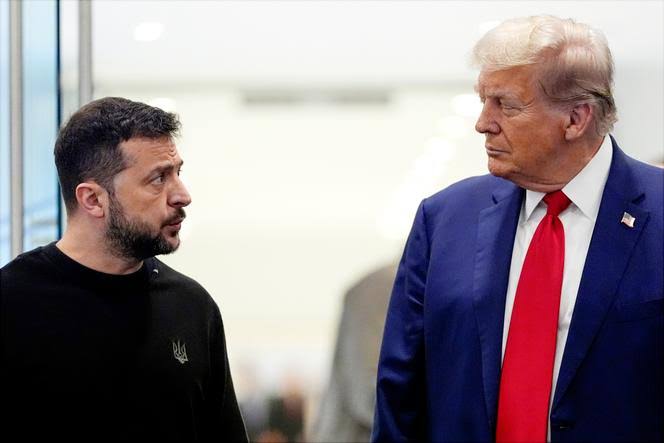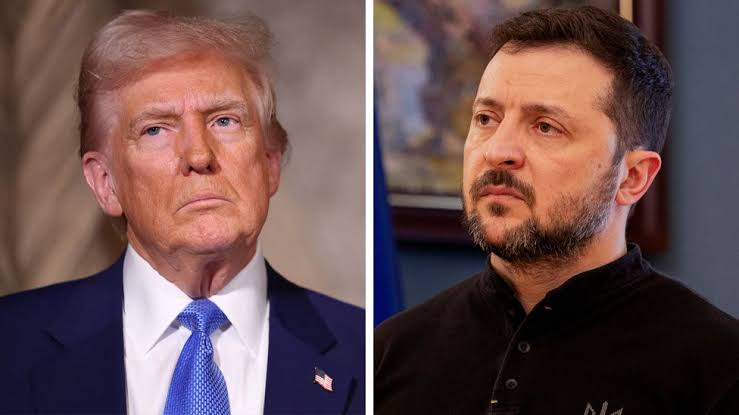Trump Secures Ukraine Mineral Deal After Standoff with Zelensky
Former U.S. President Donald Trump has reportedly forced Ukrainian President Volodymyr Zelensky into signing a deal that gives the U.S. access to Ukraine’s critical mineral deposits.
The agreement, seen as a key factor in Washington’s push for a peace settlement between Ukraine and Russia, marks a dramatic shift for Zelensky, who just days ago vowed, “I defend Ukraine, I can’t sell our country.”
Zelensky Backs Down After Tense Negotiations
On Friday, Zelensky confirmed that Ukrainian and U.S. officials were finalizing an economic agreement to ensure the deal was “fair to Kyiv.”
“We’re signing an agreement, hopefully in the next fairly short period of time,” Trump told reporters when asked about Ukraine’s mineral resources.
According to The Wall Street Journal, sources say the deal is imminent and could be signed within hours.
Trump’s Pressure Tactics
The agreement comes after weeks of intense pressure from Trump, who reportedly threatened to cut all U.S. funding to Ukraine if Zelensky refused to comply.
Zelensky’s handling of the negotiations frustrated Trump’s entire team, which included:
• Sen. JD Vance
• Sen. Marco Rubio
• Treasury Secretary Scott Bessent
• National Security Advisor Michael Waltz
Trump was particularly angered when Zelensky arrived late to a meeting with Bessent on February 12 and was allegedly “rude” when offered an initial proposal.
At another meeting in Munich on February 14, Zelensky told U.S. officials he couldn’t approve the deal alone, further infuriating Trump.
Three days later, Zelensky publicly rejected the agreement, calling it “not in the interests of a sovereign Ukraine.”
The situation escalated when Trump branded Zelensky a “dictator” on social media.
What’s at Stake: Ukraine’s $Trillions in Resources
Ukraine possesses some of Europe’s largest reserves of titanium, lithium, and rare earth minerals, which are critical for industries like aerospace, defense, and electric vehicles.
With China dominating global rare-earth supplies, securing Ukrainian resources has become a top priority for the U.S.
However, Zelensky initially rejected the U.S. offer, calling it too vague and demanding 50% of the revenue from Ukraine’s mineral deposits.
Reports indicate Trump’s initial demand was $500 billion worth of minerals—five times the $100 billion the U.S. has provided in military aid to Ukraine.
How the Deal Finally Came Together
With talks at a standstill, retired Lt. Gen. Keith Kellogg—Trump’s envoy to Ukraine—stepped in to rescue negotiations.
Despite Trump previously criticizing Kellogg for being “too pro-Zelensky”, the general traveled to Kyiv for three days of closed-door meetings.
After their discussions, Zelensky softened his stance, saying Kellogg’s involvement “restores hope” and instructing his team to finalize the deal “swiftly and sensibly.”
Key Terms of the Deal: U.S. Gets First Rights to Ukraine’s Minerals
A leaked draft of the agreement, reviewed by The Telegraph, reportedly grants the U.S. “first refusal rights” on all exportable Ukrainian minerals.
However, Ukrainian officials have raised concerns that the contract offers little in return beyond vague promises of future “security guarantees.”
A senior official told The Financial Times:
“When we looked at the details, there was nothing there [about future U.S. security guarantees].”
Another source revealed a troubling clause that effectively prioritizes U.S. interests over Ukraine’s needs:
“In other words, the contract means: ‘Pay us first, and then feed your children.’”
A Deal Worse Than Germany’s Post-WWI Reparations?
Experts have compared the contract’s terms to the Treaty of Versailles, arguing that Trump’s demands could take a greater share of Ukraine’s GDP than the reparations imposed on Germany after World War I.
Trump and his supporters have long criticized U.S. aid to Ukraine, with Trump previously mocking Zelensky as “the greatest salesman on Earth” for securing billions in military support.
What Happens Next?
While Ukraine may be on the verge of signing the deal, challenges remain.
• Much of Ukraine’s mineral-rich eastern regions are occupied by Russia.
• Mining operations have stalled due to the war, making resource extraction a major risk.
• Ukraine still demands real security guarantees, not just economic agreements.
Zelensky has suggested Kyiv could invite the EU and other allies to join the deal to ensure greater protection for Ukraine’s interests.
However, Trump’s strategy has been clear from the start: Ukraine must pay the U.S. back—with its natural resources.
















